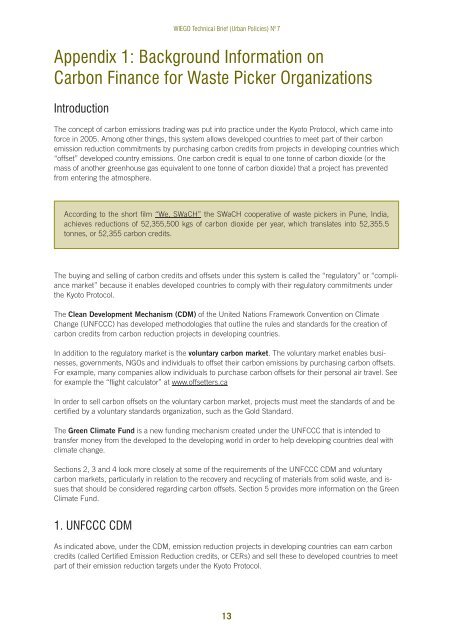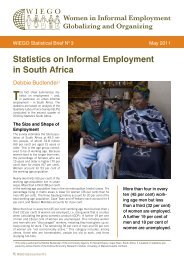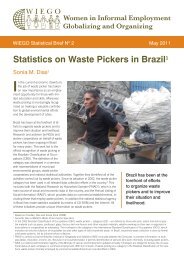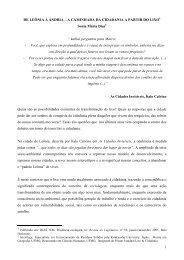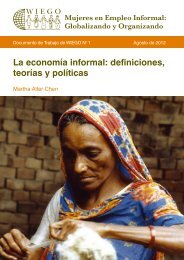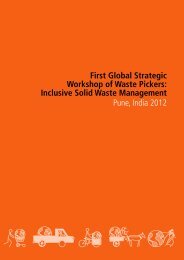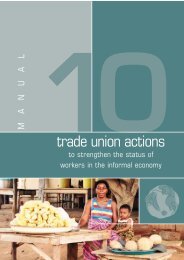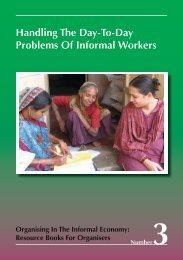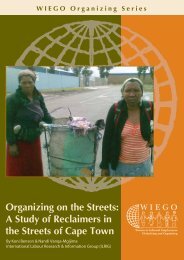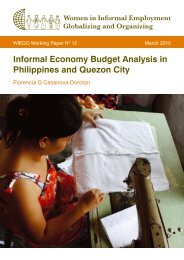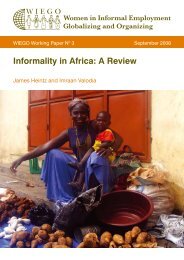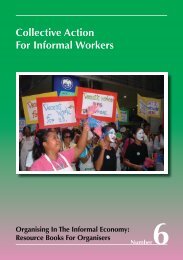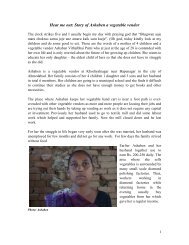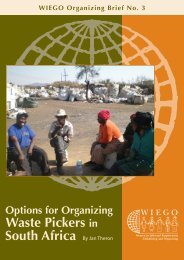Waste Pickers and Carbon Finance: Issues to Consider - WIEGO
Waste Pickers and Carbon Finance: Issues to Consider - WIEGO
Waste Pickers and Carbon Finance: Issues to Consider - WIEGO
- No tags were found...
You also want an ePaper? Increase the reach of your titles
YUMPU automatically turns print PDFs into web optimized ePapers that Google loves.
<strong>WIEGO</strong> Technical Brief (Urban Policies) N o 7Appendix 1: Background Information on<strong>Carbon</strong> <strong>Finance</strong> for <strong>Waste</strong> Picker OrganizationsIntroductionThe concept of carbon emissions trading was put in<strong>to</strong> practice under the Kyo<strong>to</strong> Pro<strong>to</strong>col, which came in<strong>to</strong>force in 2005. Among other things, this system allows developed countries <strong>to</strong> meet part of their carbonemission reduction commitments by purchasing carbon credits from projects in developing countries which“offset” developed country emissions. One carbon credit is equal <strong>to</strong> one <strong>to</strong>nne of carbon dioxide (or themass of another greenhouse gas equivalent <strong>to</strong> one <strong>to</strong>nne of carbon dioxide) that a project has preventedfrom entering the atmosphere.According <strong>to</strong> the short film “We, SWaCH” the SWaCH cooperative of waste pickers in Pune, India,achieves reductions of 52,355,500 kgs of carbon dioxide per year, which translates in<strong>to</strong> 52,355.5<strong>to</strong>nnes, or 52,355 carbon credits.The buying <strong>and</strong> selling of carbon credits <strong>and</strong> offsets under this system is called the “regula<strong>to</strong>ry” or “compliancemarket” because it enables developed countries <strong>to</strong> comply with their regula<strong>to</strong>ry commitments underthe Kyo<strong>to</strong> Pro<strong>to</strong>col.The Clean Development Mechanism (CDM) of the United Nations Framework Convention on ClimateChange (UNFCCC) has developed methodologies that outline the rules <strong>and</strong> st<strong>and</strong>ards for the creation ofcarbon credits from carbon reduction projects in developing countries.In addition <strong>to</strong> the regula<strong>to</strong>ry market is the voluntary carbon market. The voluntary market enables businesses,governments, NGOs <strong>and</strong> individuals <strong>to</strong> offset their carbon emissions by purchasing carbon offsets.For example, many companies allow individuals <strong>to</strong> purchase carbon offsets for their personal air travel. Seefor example the “flight calcula<strong>to</strong>r” at www.offsetters.caIn order <strong>to</strong> sell carbon offsets on the voluntary carbon market, projects must meet the st<strong>and</strong>ards of <strong>and</strong> becertified by a voluntary st<strong>and</strong>ards organization, such as the Gold St<strong>and</strong>ard.The Green Climate Fund is a new funding mechanism created under the UNFCCC that is intended <strong>to</strong>transfer money from the developed <strong>to</strong> the developing world in order <strong>to</strong> help developing countries deal withclimate change.Sections 2, 3 <strong>and</strong> 4 look more closely at some of the requirements of the UNFCCC CDM <strong>and</strong> voluntarycarbon markets, particularly in relation <strong>to</strong> the recovery <strong>and</strong> recycling of materials from solid waste, <strong>and</strong> issuesthat should be considered regarding carbon offsets. Section 5 provides more information on the GreenClimate Fund.1. UNFCCC CDMAs indicated above, under the CDM, emission reduction projects in developing countries can earn carboncredits (called Certified Emission Reduction credits, or CERs) <strong>and</strong> sell these <strong>to</strong> developed countries <strong>to</strong> meetpart of their emission reduction targets under the Kyo<strong>to</strong> Pro<strong>to</strong>col.13


